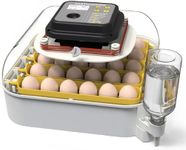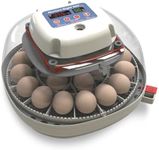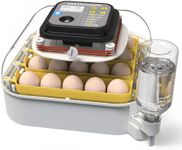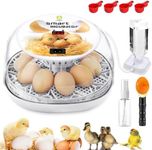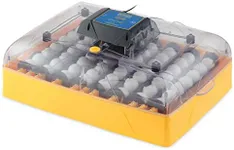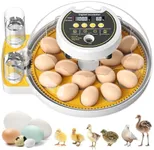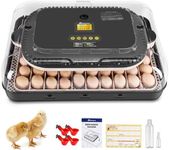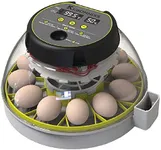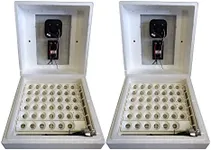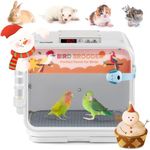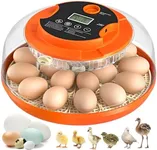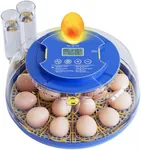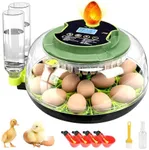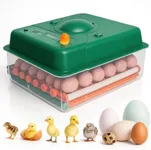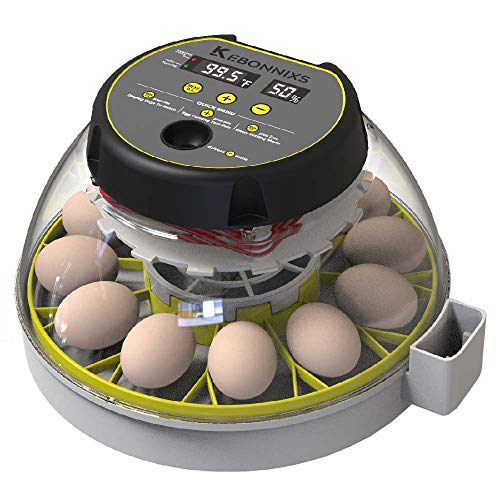Buying Guide for the Best Incubators
When choosing an incubator, it's important to consider the specific needs of the eggs you plan to hatch, as well as the features that will make the process easier and more successful. Incubators come in various sizes and with different functionalities, so understanding the key specifications will help you make an informed decision. Here are the main factors to consider when selecting an incubator.CapacityCapacity refers to the number of eggs an incubator can hold at one time. This is important because it determines how many eggs you can incubate in a single batch. Incubators come in different capacities, ranging from small models that hold a few eggs to large ones that can accommodate hundreds. If you are a hobbyist or have a small operation, a smaller capacity incubator may be sufficient. For larger operations or commercial use, a higher capacity incubator would be more appropriate.
Temperature ControlTemperature control is crucial for the successful incubation of eggs, as different types of eggs require specific temperature ranges to develop properly. A good incubator should have precise and adjustable temperature settings. Basic models may have manual controls, while more advanced ones offer digital controls and automatic regulation. If you are new to incubation, an incubator with digital controls and automatic temperature regulation can help ensure consistent and accurate temperatures, reducing the risk of errors.
Humidity ControlHumidity control is another critical factor in the incubation process, as it affects the moisture content of the eggs and the development of the embryos. Incubators with built-in humidity control allow you to set and maintain the desired humidity levels. Some models have manual water trays, while others feature automatic humidity systems. For beginners, an incubator with automatic humidity control can simplify the process and improve hatch rates.
Turning MechanismEggs need to be turned regularly during incubation to ensure even development and prevent the embryos from sticking to the shell. Incubators can have manual or automatic turning mechanisms. Manual turning requires you to turn the eggs by hand several times a day, which can be time-consuming. Automatic turning mechanisms rotate the eggs at set intervals, making the process more convenient and reducing the risk of human error. If you have a busy schedule or are incubating a large number of eggs, an incubator with an automatic turning mechanism is a better choice.
VentilationProper ventilation is essential for providing fresh air to the developing embryos and removing excess carbon dioxide. Incubators should have adjustable ventilation systems to control the airflow. Basic models may have simple vents, while more advanced ones offer adjustable fans and air circulation systems. If you are incubating eggs that require specific ventilation conditions, look for an incubator with adjustable ventilation features to ensure optimal air quality.
Ease of CleaningKeeping the incubator clean is important to prevent the spread of bacteria and ensure a healthy environment for the eggs. Some incubators are designed with removable parts and easy-to-clean surfaces, making maintenance simpler. When choosing an incubator, consider how easy it will be to clean and disinfect between batches. Models with removable trays and smooth surfaces are generally easier to clean and maintain.
Build Quality and DurabilityThe build quality and durability of an incubator are important for long-term use and reliability. Incubators made from high-quality materials are more likely to withstand regular use and provide consistent performance. Look for models with sturdy construction and good reviews regarding their durability. If you plan to use the incubator frequently or for extended periods, investing in a well-built and durable model will be beneficial.
